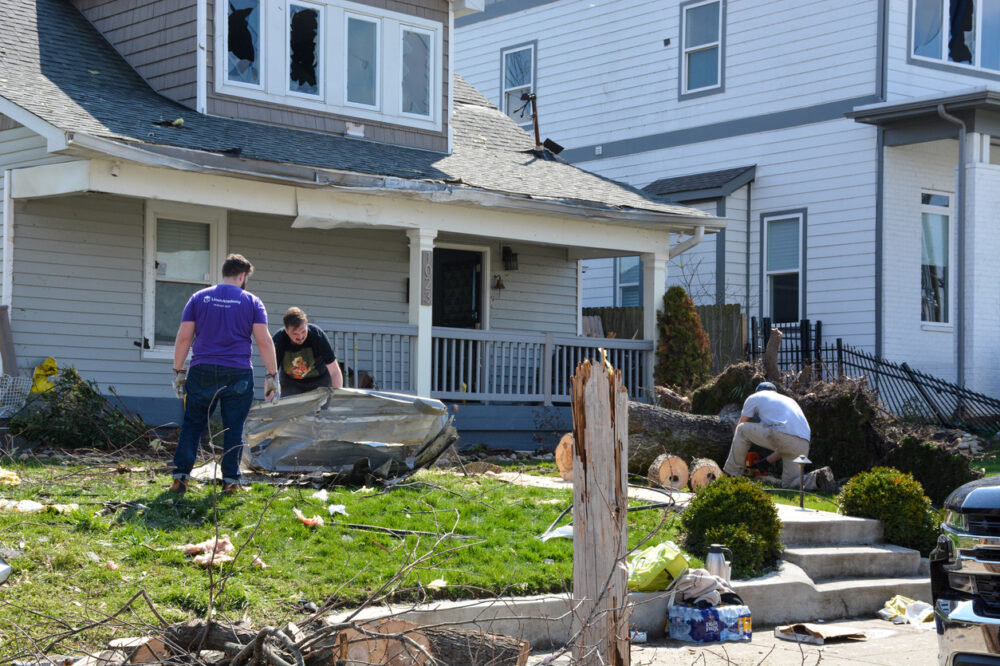When the Next Storm Comes, Will Families Be Financially Ready?
Extreme weather events and a changing climate are taking a toll on household finances, disproportionately impacting vulnerable communities. Learn how innovative financial tools and cross-sector collaboration can strengthen resilience.
-
Program:
-
Category:

For the past 20 years, the Financial Health Network has been focused on what I’ve often called the “headwinds” and “tailwinds” that shape households’ financial health. Until recently, this felt more figurative than literal – but it’s become undeniable that windier, hotter, and wetter weather is wreaking havoc on household finances in communities in every corner of the country. The widespread personal, environmental, and economic devastation brought on by the wildfires in California is just the latest data point in this trend.
Bringing Climate Resilience Home
I’m originally from Florida, and my hometown of Miami recently appointed a Chief Heat Officer tasked with protecting the well-being of vulnerable communities. Meanwhile, the state’s governor has announced that the state homeowners’ insurance program is reaching the limits of its solvency at the same time that many private insurers have pulled back from coverage, putting the financial lives of countless homeowners at risk.
My extended family lives in Georgia, where the unprecedented winds and rain of Hurricane Helene damaged an estimated $1.28 billion in timber, one of the state’s most vital industries.
And in Chicago, where I live now, a record-breaking nine inches of rain fell in 18 hours in July 2023, closing the roads and railways people use to get to work and canceling summer events. The estimated flood-related damages totaled $500 million.
These are the faces and places I envision when I think about climate resilience as financial resilience.
Braving the Storm
In a recent brief from our Financial Health Frontiers initiative supported by the Citi Foundation, we explored the financial impact of weather and climate on an array of household expenses: from health care costs driven by a record number of heat-related emergency room visits to skyrocketing utility bills and food costs. Homeownership, often a family’s greatest source of wealth, is also perilously threatened by disasters that insurance increasingly will not cover.
Weather events are about people who lose homes, income, and sometimes loved ones; renters who have limited ability to recoup property losses; workers who miss paychecks; and small business owners who can’t afford to reopen.
And while extreme weather affects communities everywhere, people with low incomes and underinvested communities bear the brunt of the impact. They are more likely to live in older, less energy-efficient homes, flood zones, or heat islands and to face a loss of income as a result. They also disproportionately feel the effects of price increases on everything from food to insurance.
That’s why building climate resilience in families must involve efforts to improve financial security across the board, too.
Collaborating To Build Climate and Financial Resilience
Our report, Strengthening Financial Health for Climate Resilience, offers actionable solutions aimed at fostering resilience to weather-related financial stressors. From mitigation and adaptation to preparedness, response, and recovery, we outline four pillars that are central to building financial resilience, using an emergency management framework to address this issue just as we might approach any number of climate emergencies that communities across the country experience. Emerging solutions for strengthening financial health include:
-
- Technology that makes the insurance claims process more efficient and speeds up insurance payments to homeowners and contractors, like that used by iink Payments
- “Parametric insurance,” which defines conditions such as rainfall total or wind speed and automatically triggers insurance payments to policyholders, as implemented by Raincoat
- Banks and other financial service providers, such as Bank of America, that facilitate access to mobile and online banking when a natural disaster occurs so those affected can deposit checks and pay bills
There’s no shortage of opportunity to engage on this issue: Governments at every level, financial institutions, employers, insurance providers, fintechs, community nonprofits, and philanthropy all have a role to play.
By thinking about weather as an economic issue for the country and a financial health issue for individual households – especially for the most vulnerable among us – we can explore interventions to boost financial resilience in the face of extreme weather.
Explore Financial Health Frontiers
Supported by the Citi Foundation, this Financial Health Network initiative galvanizes momentum for a new era of innovation in financial services and policy – an era that will fundamentally shift our society to advance financial health for all.
